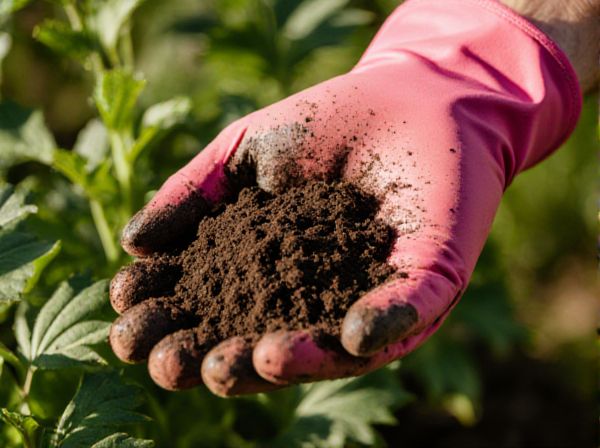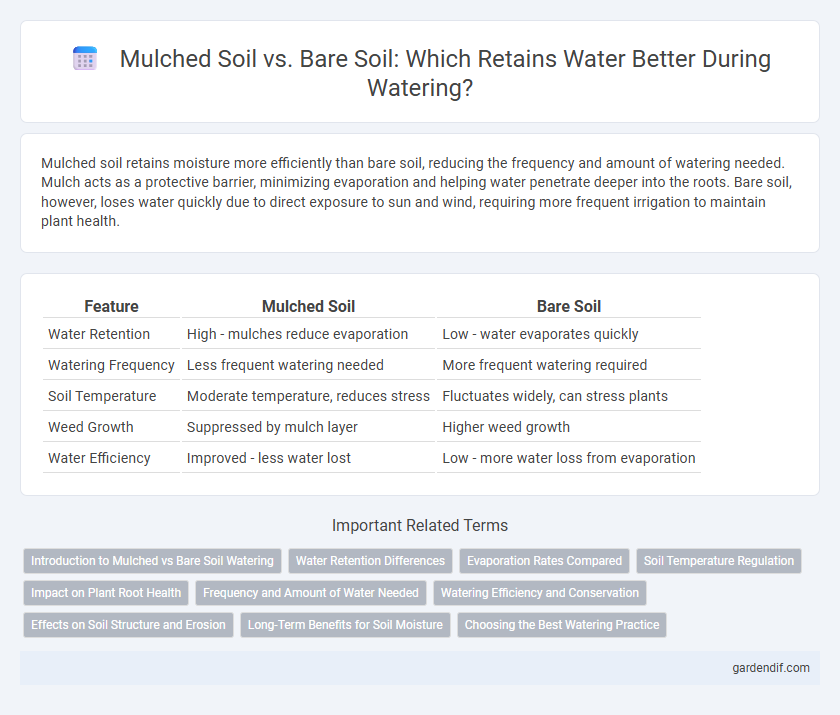
Mulched soil vs Bare soil watering Illustration
Mulched soil retains moisture more efficiently than bare soil, reducing the frequency and amount of watering needed. Mulch acts as a protective barrier, minimizing evaporation and helping water penetrate deeper into the roots. Bare soil, however, loses water quickly due to direct exposure to sun and wind, requiring more frequent irrigation to maintain plant health.
Table of Comparison
| Feature | Mulched Soil | Bare Soil |
|---|---|---|
| Water Retention | High - mulches reduce evaporation | Low - water evaporates quickly |
| Watering Frequency | Less frequent watering needed | More frequent watering required |
| Soil Temperature | Moderate temperature, reduces stress | Fluctuates widely, can stress plants |
| Weed Growth | Suppressed by mulch layer | Higher weed growth |
| Water Efficiency | Improved - less water lost | Low - more water loss from evaporation |
Introduction to Mulched vs Bare Soil Watering
Mulched soil retains moisture significantly better than bare soil, reducing water evaporation and enhancing water absorption by plant roots. Studies show mulched soil can conserve up to 50% more water compared to bare soil, promoting healthier plant growth and reducing irrigation frequency. Mulching also improves soil structure and temperature regulation, leading to more efficient water usage in gardening and agriculture.
Water Retention Differences
Mulched soil significantly improves water retention compared to bare soil by reducing evaporation and maintaining moisture levels for longer periods. Organic mulch materials like straw or wood chips create a protective layer that insulates the soil, helping roots access consistent moisture. In contrast, bare soil is prone to quicker drying, leading to more frequent watering needs and increased water loss.
Evaporation Rates Compared
Mulched soil significantly reduces evaporation rates compared to bare soil by creating a protective barrier that retains moisture and regulates soil temperature. Studies show evaporation from mulched soil can be reduced by up to 75%, ensuring more efficient water use and promoting healthier plant growth. This moisture retention helps maintain consistent hydration levels, decreasing the frequency and volume of watering required.
Soil Temperature Regulation
Mulched soil significantly improves soil temperature regulation by insulating the ground, reducing temperature fluctuations compared to bare soil. This insulation helps maintain a stable root environment, promoting healthier plant growth and reducing water evaporation. In contrast, bare soil experiences greater temperature extremes that can stress plants and increase water loss.
Impact on Plant Root Health
Mulched soil retains moisture more efficiently than bare soil, reducing water evaporation and promoting consistent hydration of plant roots, which enhances root growth and overall plant health. In contrast, bare soil often experiences rapid drying, leading to water stress that weakens root structures and increases susceptibility to disease. The insulating properties of mulch also regulate soil temperature, creating a stable environment that supports robust root development.
Frequency and Amount of Water Needed
Mulched soil retains moisture more effectively than bare soil, reducing the frequency of watering required by up to 50%. Mulch acts as a barrier, minimizing evaporation and maintaining consistent soil hydration, which means less water is needed per session. In contrast, bare soil loses water quickly, necessitating more frequent and larger amounts of water to sustain plant health.
Watering Efficiency and Conservation
Mulched soil retains moisture up to 50% longer than bare soil, significantly reducing watering frequency and promoting water conservation. The organic layer minimizes evaporation by acting as a barrier between the soil and sun, enhancing watering efficiency. Mulching also improves soil structure and water absorption, ensuring deeper root hydration compared to bare soil.
Effects on Soil Structure and Erosion
Mulched soil improves water retention and reduces soil erosion by protecting the surface from direct impact of raindrops, maintaining soil structure and preventing crust formation. Bare soil is more susceptible to erosion due to runoff and compaction, which degrades soil porosity and disrupts aggregate stability. The presence of mulch promotes healthier microbial activity and enhances the soil's ability to absorb and retain moisture effectively.
Long-Term Benefits for Soil Moisture
Mulched soil retains moisture significantly longer than bare soil, reducing evaporation rates by up to 50%, which enhances water conservation over time. The organic matter in mulch improves soil structure and promotes beneficial microbial activity, leading to increased water infiltration and retention. Long-term mulching results in healthier soil ecosystems that sustain consistent moisture levels, supporting plant growth and reducing the frequency of watering needed.
Choosing the Best Watering Practice
Mulched soil retains moisture significantly better than bare soil, reducing water evaporation by up to 70% and promoting deeper root growth. Choosing mulched soil for watering enhances soil temperature regulation and minimizes weed growth, leading to more efficient water usage. Bare soil requires more frequent watering due to faster evaporation, making mulched soil the optimal choice for sustainable garden irrigation.
Mulched soil vs Bare soil watering Infographic

 gardendif.com
gardendif.com